Stories
The stories included in the collection are:
- "England, My England"
- "Tickets, Please"
- "The Blind Man"
- "Monkey Nuts"
- "Wintry Peacock"
- "You Touched Me"
- "Samson and Delilah"
- "The Primrose Path"
- "The Horse Dealer's Daughter"
- "Fanny And Annie"
"Wintry Peacock"
The short story "Wintry Peacock" tells the story of an Englishwoman who has been left with her husband's parents for the duration of the war. Shortly before her husband's return, there is a letter addressed to her husband written in French. She asks a man she sees in passing to translate it, and although the letter details that her husband had an affair with a young woman while away at war, and that this woman had recently delivered a baby by him and plans to come to England, the man translating tells the woman instead that the baby is the young girl's newborn brother and that her parents named the child after the soldier for having protected their family during the war. That evening the man finds the woman's peacock in the cold and takes it in, returning it the following day to find that the husband has returned. When asked in private what the letter had said, the letter having since been burnt according to his wife, the translator tells the husband both what the letter said, leaving out that the woman and her child are coming to England, and tells him also what he told his wife. The husband laughs and jokingly berates the man for bringing the peacock home and suggests that, although his wife loves it very much, he will perhaps kill it. The two both laugh, seemingly at the misfortune of both the wife and the mistress, although the translator may be laughing as well at the husband himself.
"You Touched Me"
"You Touched Me" tells the story of a young boy who is adopted by a family that is without any male children. The mother having died, and one sister having been married off, two sisters remain with the father and raise the boy, although the boy is reluctant to embrace the education and lifestyle offered him and opts to leave for Canada. When war breaks out the boy returns as a young man and spends time with the patriarch of the house who is close to death. The sisters believe the young man is in search of a legacy, but when the elder sister mistakenly brushes her hand against the young man, thinking that it is her father in the dark of her father's bedroom, the young man asks the father for the daughter's hand in marriage, even though she is old enough to be his mother. Both daughters are opposed to the proposition and assume the young man is doing this in hopes of inheriting money (although the boy admits to himself alone that this is only part of the reason, as he wants both the money and the daughter). The father redrafts his will, stating that his entire legacy will go to the young man if his daughter refuses to marry him. The daughter eventually gives in and while on his death bed the father demands to watch his elder daughter kiss the young man as if asserting his will over his daughter.
"Samson and Delilah"
"Samson and Delilah" details the narrative of a woman whose husband had abandoned both her and her newborn child to go mining for gold, only to return unannounced some fifteen years later to the lodging where his wife serves as a landlady. Although she at firsts denies being his wife, she eventually admits to it, but only after having soldiers staying at her lodgings tie up her husband and leave him outside. He breaks free from the rope restraining him, and re-enters the lodgings, finding his wife sitting by the warmth of a fire. He takes a seat next to her and admits to his wrongdoing, but asks her to take him back, telling her that he has returned with a thousand pounds to his name.
"The Primrose Path"
"The Primrose Path" tells of the youngest sibling of a family, considered to be a black sheep of sorts, who leaves his first wife for a young woman who later, according to him, poisons him. He jumps around from England to Australia and back, where he finally settles in as a taxi-cab driver and takes up with a young woman, living with both her and her mother. A nephew of his reconnects with him and tells him that his first wife is dying of consumption, and on her deathbed asks that he takes their remaining daughter (the elder of their two daughters was given to a wealthy aunt). He agrees and then returns to his girlfriend's home with his nephew to share dinner. At the end of the narrative it is stated that the young girl will leave him, suggesting the fleeting nature of the life he has chosen.

This article contains summaries and commentaries of the 100 stories within Giovanni Boccaccio's The Decameron.

She Stoops to Conquer is a comedy by Oliver Goldsmith, first performed in London in 1773. The play is a favourite for study by English literature and theatre classes in the English-speaking world. It is one of the few plays from the 18th century to have retained its appeal and is still regularly performed. The play has been adapted into a film several times, including in 1914 and 1923. Initially the play was titled Mistakes of a Night and the events within the play take place in one long night. In 1778, John O'Keeffe wrote a loose sequel, Tony Lumpkin in Town.

Sarah is a biblical matriarch and prophetess, a major figure in Abrahamic religions. While different Abrahamic faiths portray her differently, Judaism, Christianity, and Islam all depict her character similarly, as that of a pious woman, renowned for her hospitality and beauty, the wife and half-sister of Abraham, and the mother of Isaac. Sarah has her feast day on 1 September in the Catholic Church, 19 August in the Coptic Orthodox Church, 20 January in the LCMS, and 12 and 20 December in the Eastern Orthodox Church.
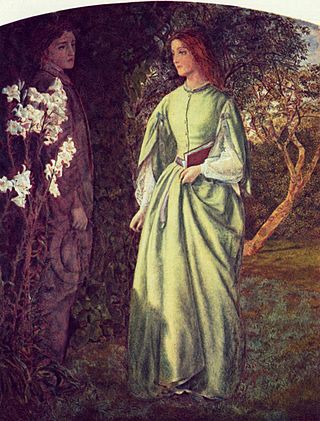
Aurora Leigh (1856) is an epic poem/novel by Elizabeth Barrett Browning. The poem is written in blank verse and encompasses nine books. It is a first-person narration, from the point of view of Aurora; its other heroine, Marian Erle, is an abused self-taught child of itinerant parents. The poem is set in Florence, Malvern, London and Paris. The work references Biblical and classical history and mythology, as well as modern novels, such as Corinne ou l'Italie by Anne Louise Germaine de Staël and the novels of George Sand. In Books 1-5, Aurora narrates her past, from her childhood to the age of about 27; in Books 6–9, the narrative has caught up with her, and she reports events in diary form. The author styled the poem "a novel in verse", and referred to it as "the most mature of my works, and the one into which my highest convictions upon Life and Art have entered". The scholar Deirdre David asserts that Barrett Browning's work in Aurora Leigh renders her "a major figure in any consideration of the nineteenth-century woman writer and of Victorian poetry in general". John Ruskin called it the greatest long poem of the nineteenth century.

Parker Pyne Investigates is a short story collection written by Agatha Christie and first published in the UK by William Collins and Sons in November 1934. Along with The Listerdale Mystery, this collection did not appear under the usual imprint of the Collins Crime Club but instead appeared as part of the Collins Mystery series. It appeared in the US later in the same year published by Dodd, Mead and Company under the title Mr. Parker Pyne, Detective. The UK edition retailed at seven shillings and sixpence (7/6) and the US edition at $2.00.

Poirot's Early Cases is a short story collection written by Agatha Christie and first published in the UK by Collins Crime Club in September 1974. The book retailed at £2.25. Although the stories contained within the volume had all appeared in previous US collections, the book also appeared there later in 1974 under the slightly different title of Hercule Poirot's Early Cases in an edition retailing at $6.95.
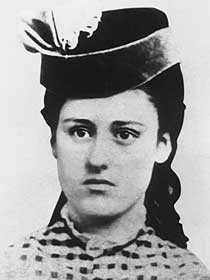
Grace Greenwood Bedell Billings was an American woman, notable as a person whose correspondence, at the age of eleven, encouraged Republican Party nominee and future president Abraham Lincoln to grow a beard. Lincoln later met with Bedell during his inaugural journey in February 1861.

Cutting It is a BBC television drama series set in Manchester, England, focusing on the lives and loves of the team running a hairdressing salon. It ran for four series between 2002 and 2005. The show features a number of actors who subsequently became established stars, including Amanda Holden and Ben Daniels.
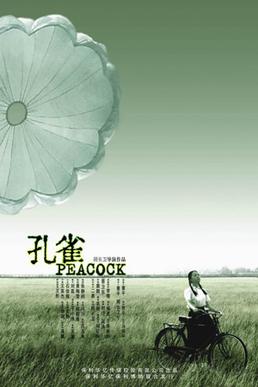
Peacock is a 2005 film directed by Gu Changwei, written by Li Qiang. This is Gu's first film as director after a lengthy career as a cinematographer for some of China's top directors. The film premiered simultaneously in both China and in competition at the 2005 Berlin International Film Festival, going on to receive Berlin's Jury Grand Prix Silver Bear.
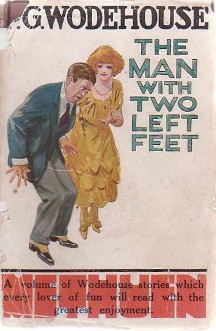
The Man with Two Left Feet, and Other Stories is a collection of short stories by British author P. G. Wodehouse, first published in the UK on 8 March 1917 by Methuen & Co., London, and in the US on 1 February 1933 by A. L. Burt and Co., New York. All the stories had previously appeared in periodicals, usually The Strand Magazine in the United Kingdom and The Red Book Magazine or The Saturday Evening Post in the United States.
The Red Thread of Fate, also referred to as the Red Thread of Marriage, and other variants, is an East Asian belief originating from Chinese mythology. It is commonly thought of as an invisible red cord around the finger of those that are destined to meet one another in a certain situation as they are "their true love". According to Chinese legend, the deity in charge of "the red thread" is believed to be Yuè Xià Lǎorén (月下老人), often abbreviated to Yuè Lǎo (月老), the old lunar matchmaker god, who is in charge of marriages. In the original Chinese myth, it is tied around both parties' ankles, while in Japanese culture it is bound from a male's thumb to a female's little finger. Although in modern times it is common across both these cultures to depict the thread being tied around the fingers, often the little finger. The color red in Chinese culture symbolises happiness and it is also prominently featured during Chinese weddings.

Will You Please Be Quiet, Please? (1976) was the first major-press short-story collection by American writer Raymond Carver. Described by contemporary critics as a foundational text of minimalist fiction, its stories offered an incisive and influential telling of disenchantment in the mid-century American working class.

The Black Bull of Norroway is a fairy tale from Scotland. A similar story titled The Red Bull of Norroway first appeared in print in Popular Rhymes of Scotland by Robert Chambers in 1842. A version titled The Black Bull of Norroway in the 1870 edition of Popular Rhymes of Scotland was reprinted in an Anglicised version by Joseph Jacobs in his 1894 book More English Fairy Tales.
The Golden Crab is a Greek fairy tale collected as "Prinz Krebs" by Bernhard Schmidt in his Griechische Märchen, Sagen and Volkslieder. Andrew Lang included it in The Yellow Fairy Book.
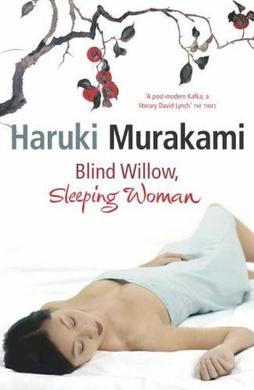
Blind Willow, Sleeping Woman is a collection of 24 short stories by Japanese author Haruki Murakami.

Éponine Thénardier, also referred to as the "Jondrette girl", is a fictional character in the 1862 novel Les Misérables by Victor Hugo.
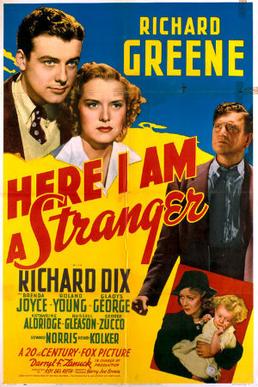
Here I Am a Stranger is a 1939 American drama film directed by Roy Del Ruth and written by Sam Hellman and Milton Sperling. The film stars Richard Greene and Richard Dix as son and father. It was based on the short story of the same name by Gordon Malherbe Hillman. The film was released on September 28, 1939, by 20th Century Fox.

Kitni Girhain Baaki Hain is a Pakistani anthology thriller drama television series, that airs on Hum TV. Created by Angeline Malik, the series is a sequel to the anthology series Kitni Girhain Baaki Hain (2011–2014). It premiered on 30 October 2016 with a different cast and story in each episode.

England and Other Stories is a 2014 collection of 25 short stories by the author Graham Swift.
The Horse Lurja is a Georgian folktale about the friendship between a princess and a magic horse, which sacrifices itself for her after it rescues her from great peril. Although the tale appears in Georgia, some scholars recognize similar narratives in Central Asia and across Europe.

















